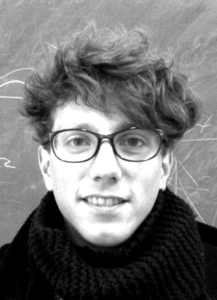Highlights
Awards and Honors
German Life Science Award
Dr. Michael Hiller, Gurppenleiter am Max-Planck-Institut für Physik komplexer Systeme und am Max-Planck-Institut für molekulare Zellbiologie und Genetik in Dresden, erhält den German Life Science Awrad. Der Bioinformatiker vergleicht das Erbgut von Menschen, Affen und anderen Tieren, um die Unterschiede zwischen den Arten mit den Abweichungen in ihren Genen zu korrelieren. Seine Ergebnisse könnten auch der Medizin nützen.
weiterlesenAwards and Honors
Stephan Grill wird mit dem Binder-Innovationspreis (Deutsche Gesellschaft für Zellbiologie) ausgezeichnet
Der Wissenschaftler überzeugte die unabhängige Fachjury mit seinem Beitrag über das Zusammenspiel von mechanischen und biochemischen Signalen für den biologischen Prozess der Zellpolarisation.
weiterlesenAwards and Honors
Jonas Ranft mit Otto-Hahn-Medaille 2012 ausgezeichnet
Seit 1978 zeichnet die Max-Planck-Gesellschaft jedes Jahr junge Wissenschaftlerinnen und Wissenschaftler für herausragende wissenschaftliche Leistungen, die sie in der Regel im Zusammenhang mit ihrer Doktorarbeit erbracht haben, mit der Otto-Hahn-Medaille aus. Diese ist mit einem Anerkennungsbetrag von 7500 Euro verbunden.
weiterlesenPublication Highlights
Cell-body rocking is a dominant mechanism for flagellar synchronization in a swimming alga
The eukaryotic flagellum is a best-seller of nature: These slender cell appendages propel sperm and many other microswimmers, including disease-causing protists. In mammalian airways or the oviduct, collections of flagella beat in synchrony to pump fluids efficiently. Flagellar synchronization was proposed to rely on mechanical feedback by hydrodynamic forces, but the details are not well understood. Here, we used theory and experiment to elucidate a mechanism of synchronization in the model organism Chlamydomonas, a green algal cell that swims with two flagella like a breaststroke swimmer. Our analysis shows how synchronization arises by a coupling of swimming and flagellar beating and characterizes an exemplary force–velocity relationship of the flagellar beat.
Veikko F. Geyer, Frank Jülicher, Jonathon Howard, and Benjamin M. Friedrich
PNAS 110 (45), 18058 (2013)
weiterlesenInstitute's News
New research group 'Quantum Matter – Transport and Dynamics'
The new research group is headed by Dr. Jens Bardarson and studies quantum matter, condensed matter which properties are dominated by quantum effect, with focus ranging from fundamental theory to direct comparison and collaboration with
experimental groups, in particular in Dresden.
weiterlesenInstitute's News
New research group 'Self-Organization of Biological Structures'
The junior research group headed by Dr. Jan Brugués is affiliated with both our institute and the MPI of Molecular Cell Biology and Genetics. It is focused on understanding how the large-scale patterns and behaviors of biological structures emerge from the collective behaviors of molecules.
weiterlesenPublication Highlights
Engineering Ising-XY spin-models in a triangular lattice using tunable artificial gauge fields
Magnetism plays a key role in modern science and technology, but still many open questions arise from the interplay of magnetic many-body interactions. Deeper insight into complex magnetic behaviour and the nature of magnetic phase transitions can be obtained from, for example, model systems of coupled XY and Ising spins. Here, we report on the experimental realization of such a coupled system with ultracold atoms in triangular optical lattices. This is accomplished by imposing an artificial gauge field on the neutral atoms, which acts on them as a magnetic field does on charged particles. As a result, the atoms show persistent circular currents, the direction of which provides an Ising variable. On this, the tunable staggered gauge field, generated by a periodic driving of the lattice, acts as a longitudinal field. Further, the superfluid ground state presents strong analogies with the paradigm example of the fully frustrated XY model on a triangular lattice.
J. Struck, M. Weinberg, C. Ölschläger, P. Windpassinger, J. Simonet, K. Sengstock, R. Höppner, P. Hauke, A. Eckardt, M. Lewenstein & L. Mathey
Nature Physics 9, 738–743 (2013)
weiterlesenAwards and Honors
European Physical Society Condensed Matter Division Europhysics Prize 2012
The 2012 EPS Condensed Matter Division Europhysics Prize is awarded to Steven Bramwell, Claudio Casternovo, Santiago Grigera, Roderich Moessner, Shivaji Sondhi and Alan Tennant for the prediction and experimental observation of magnetic
monopoles in spin ice. The Prize will be presented at the forthcoming EPS CMD General Conference in Edinburgh (UK).
weiterlesenPublication Highlights
Liquid transport facilitated by channels in Bacillus subtilis biofilms
Many bacteria on earth exist in surface-attached communities known as biofilms. These films are responsible for manifold problems, including hospital-acquired infections and biofouling, but they can also be beneficial. Biofilm growth depends on the transport of nutrients and waste, for which diffusion is thought to be the main source of transport. However, diffusion is ineffective for transport over large distances and thus should limit growth. Nevertheless, biofilms can grow to be very large. Here we report the presence of a remarkable network of well-defined channels that form in wild-type Bacillus subtilis biofilms and provide a system for enhanced transport. We observe that these channels have high permeability to liquid flow and facilitate the transport of liquid through the biofilm. In addition, we find that spatial variations in evaporative flux from the surface of these biofilms provide a driving force for the flow of liquid in the channels. These channels offer a remarkably simple system for liquid transport, and their discovery provides insight into the physiology and growth of biofilms.
James N. Wilking, Vasily Zaburdaev, Michael De Volder, Richard Losick, Michael P. Brenner and David A. Weitz
PNAS 110 (3), 848 (2013)
weiterlesenAwards and Honors
Mitgliedschaft in der Sächsischen Akademie der Wissenschaften zu Leipzig
Prof. Jan-Michael Rost ist zum Mitglied der Sächsischen Akademie der Wissenschaften zu Leipzig ernannt worden.
weiterlesen







